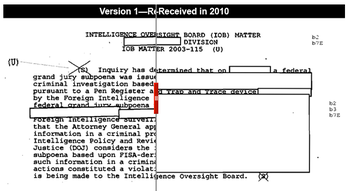FOIA Friday: Releasing the secrets of diplomats, intelligence agencies, and cooks
A batch of FOIA requests that I sent to the city of Ann Arbor in the past three weeks all arrived over the past few days. As I sort through those forms, meeting minutes, reports and statements, I realized that though I had some perfectly good partial stories to tell, it would be better to wait until the fragments that I have collected got processed a bit more and there was something coherent to say that made a full a story.
Fortunately, the world is full of reporters, advocacy groups, and civic organizations who are filing FOIA requests and writing about what they find and what is hidden from them. Here are accounts by Consumer Reports getting information from the Consumer Product Safety Commission and the by the Electronic Frontier Foundation, examining FBI files that show the level of diligence necessary to deal with slow-moving agency bureaucracy. In contrast, the WikiLeaks cables and the news reaction to them show what the press and the world can do when faced with a surplus of suddenly released secrets.
Consumer Reports and product safety
Consumer Reports, in its January 2011 issue, writes about glass bakeware and the risk to the public from shattered glass. This is a story that took it a full year to collect information from the Consumer Product Safety Commission through the FOIA process.
On the FOIA process, Consumer Reports writes:
Of the shattering incidents we analyzed, 152 came from CPSC files, most obtained in response to our FOIA requests for complaints consumers filed about Pyrex or Anchor Hocking bakeware. Though the CPSC received these requests in early November 2009, it took nearly six months for us to receive incident reports involving Anchor Hocking bakeware and nearly eight months to receive complaints involving Pyrex. The process took so long in part because by law, the CPSC has not been allowed to release copies of complaints without first giving manufacturers an opportunity to comment on them. If companies dispute the release of any information or claim that it is confidential, the CPSC must then review any comments and decide whether to release the information. This results in further delays.
A new database, SaferProducts.GOV, is due to be released in March 2011. It will provide an easier way for the public to get information about product defects and safety issues. The site is up describing the government's plans to allow citizens to submit product defect reports, which will be promptly visible to the world at or about the same time that manufacturers are notified.
Electronic Frontier Foundation and inconsistent redaction

Two versions of the same document released by the FBI to the Electronic Frontier Foundation show that the agency used a heavier hand in redacting information the second time they released it under the Freedom of Information Act.
FBI Intelligence Oversight Board, via the Electronic Frontier Foundation
The story employs the use of a clever slider to show both versions of the document, highlighting the differences between two versions released.
EFF files a lot of FOIA requests with agencies which are slow and balky at filling them, and you can see its frustration with the process clearly in this portion of the analysis section.
When the FOIA process works properly (i.e., when agencies do not withhold more information than they are entitled to under the Act and do not drag their feet on releasing records until someone challenges them either through a request or litigation), all Americans benefit. However, when federal agencies arbitrarily withhold information and don’t play by the rules, it makes it more likely that entities like WikiLeaks will feel the need to work around a broken system that seems to encourage unnecessary secrecy.
Covering Wikileaks
I'm not going to even try to write the WikiLeaks story; it's been too much in the news to give me a way to do a capsule summary of what's going on, as journalists and citizens sift through hundreds of thousands of leaked diplomatic cables, diplomats and governments worldwide react to the publication of state secrets, and computer systems operators struggle to keep up with the attacks by the online group called Anonymous, which is extracting revenge on organizations that have crossed WikiLeaks.
Two news organizations are doing an exceptional job of keeping up with the sheer volume of news that's being generated, each in their own distinctive fashion.
The Guardian's daily WikiLeaks live updates for today shows an incredible volume of news, with writers live-blogging the ongoing story at the pace of four or five paragraph-sized updates an hour. They pause to summarize a few times a day, and then carry on with a combination of original reporting and clippings of news stories from other news organizations. Hit refresh every 15 minutes, and you are likely to get something new.
The New York Times' "The Lede" blog has a similar live blog coverage of WikiLeaks for today with a similarly impressive and comprehensive combination of original reporting and clippings from the world press.
The Guardian's efforts read more informally, like the voice of embedded blogger posted to the newsroom who intersperses running commentary with schedule notes. The Guardian's latest batch of WikiLeaks stories will appear around 9.30pm just in case you're wondering. In the meatime, I'm nipping off to our canteen. The Times writer perhaps writes at his desk, writing the news completely straight without any sense that anything else is going on except this story. Both have excellent and commendable coverage.
Edward Vielmetti writes the FOIA Friday column for AnnArbor.com.

